Behind the facade of rhetoric and spin, governments around the world are engaged in a subtle, secret dance designed to keep the peace and solve the greatest problems the world faces. Very few get to experience the realities of diplomacy but that doesn’t stop us speculating and imagining what it could be like to be faced with a crisis that could spark war or negotiate a complex international alliance. Basically, who doesn’t want to imagine they are in the West Wing?! For years real time strategy, 4X and grand strategy games have placed us in worlds on the brink of crisis or put us in charge or building a town, city, nation or empire, allowing us to live out our fantasies of world domination through the monitor in pixel form. But do these games get it right? Can they make it feel worthwhile and important? Or do we have to settle for a flawed compromise?
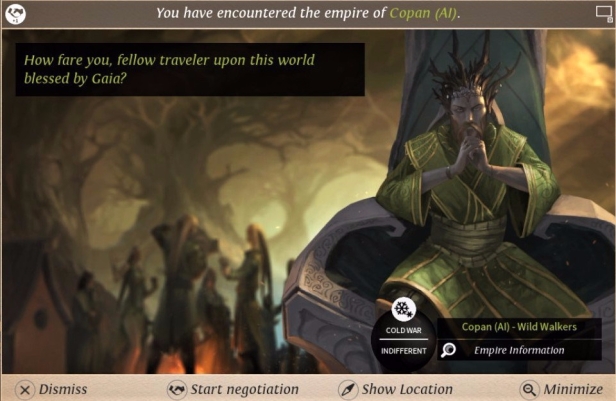
Of course I am no expert when it comes to the intricacies of modern diplomacy or international relations, who has time to study when Carthage need to be crushed and the entire Mediterranean brought under my control? *insert maniacal twisted evil laugh here* (However if you do want to read a bit about these subjects I thoroughly recommend “Diplomacy: A Very Short Introduction” by Joseph M. Siracusa and “International Relations: A Very Short Introduction” by Paul Wilkinson). However it doesn’t take much to understand how inter-faction relations work in strategy games, at least the many I’ve played. In essence it’s a points system, you do something an opposing factions approves of you get more points and they “like” more, if you do something they don’t like you lose points and they “like” you less or even hate you. Added into the mix can be a variety of subtle factors like the strength of your armies, the length of time you’ve had a trade agreement or how many gifts you’ve sent blah blah blah but it all boils down to points, points and points. Oh wait did I mentions points?
On the surface this kind of system makes sense but often leads to strange or unsatisfactory interactions. For the purposes of this article I will be considering two simple aspects of in game diplomacy: trade and war.
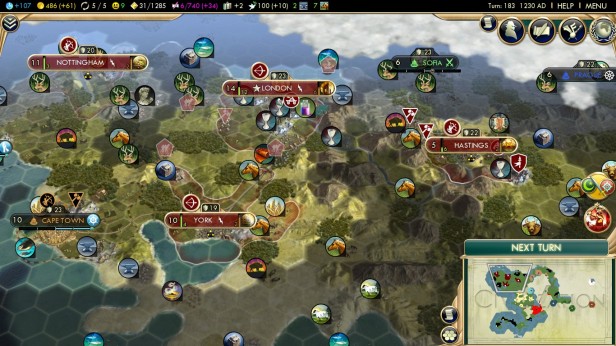
At the heart of all strategy games are resources. Between titles they vary in name and function but the core tenant of their existence remains the same: manage them properly or you will lose. Roughly speaking there are three types of resources; currency, production and luxury. Each gives your side wealth, infrastructure and happiness respectively, allowing your faction to build and prosper. Balancing the resources you have and getting hold of the resources you need is key to survival and victory. Thus it is often necessary to don an unnaturally wide smile and enter into trade negotiations with a competitor. After a quick chat everyone gets what they want because trade is good and everyone can get on with their plans, oh wait no that hardly ever happens… Instead what usually happens is that you are completely stonewalled. This doesn’t happen because the deal is bad, imbalanced or unsustainable, on the contrary in these games trade is almost universally good, it happens due to, you guessed it, a lack of points! This means you either have to shower your competitor with gifts in an attempt to soften them up (which weakens your economy because you have fewer resources) or wait until you have accrued positive points some other way. This would be fine if it felt like you were working towards building a meaningful relationship but we are fobbed off with excuses like “Our people wouldn’t like your goods”, “This would not be beneficial to us” or plain old “No”, eroding away at that sense of grandeur and importance that you once felt as an empire builder.
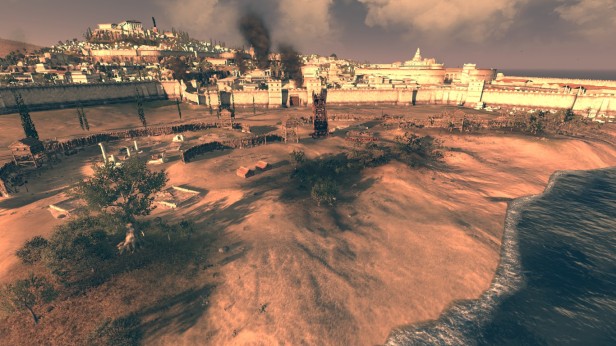
This brings us to what we are (probably) amassing resources for: war. I know this may sound crazy because when have trade, resources or territorial ambitions EVER caused conflict?! Add to this that the in-suppressible desire to win and then, well we have a royal shit show on our hands… Of course the name of the game is to win and if you are winning, someone else is losing and they aren’t going to be happy about it.
Putting a city in the wrong place, “treading” on some patch of grass that’s off limits or talking to the Empress of Blahface for too long are sure to piss of your rivals, sending your diplomatic score plummeting through the floor. To be honest this works quite well, bad actions or mismanagement of relations should lead to deterioration and ultimately war. However, once again this points based system is far from perfect. The ease with which one initiates or is drawn into a military campaign is in stark contrast to how difficult it is to restore or improve relations after conflict. Now of course the basic idea of this makes sense; it would be entirely unrealistic if previous transgressions were completely forgotten as soon as hostilities ended and everyone skipped off into the sunset holding hands. The problem is it is almost impossible to restore relations. You end up engaged in a constant spat unless you completely annihilate the enemy. Frankly it’s annoying. To further escalate the problem all other factions will probably see you in somewhat of a negative light because you’ve been “aggressive”, bringing a frosty tone to all future negotiations. These factors all conspire to make war a hot mess that you really have to be ready for and commit to. Whilst this is how I think it should be, the ineffectiveness of the diplomacy systems don’t give any wiggle room. They don’t let the game move on from events and actually ensure that they disproportionately inform how the game will unfold from that point on.
Well, only if you are not a computer controlled faction. It turns out the computer can do whatever it likes with little to no consequence. That’s right, the points are a lie! Well kind of… As players our positive or negative feelings towards another faction (or points) are not logged in the game. They are our opinions and as the game unfolds they are subject to change. This is not really the case for the computer controlled factions who stick dogmatically to their tally chart of feelings. The effects of actions do fall off with time but it’s usually very slow. This rigidity firmly places your opponent in the driving seat of most negotiations which reinforces feelings of isolation and lack of realism. It also makes you the vulnerable partner in any treaty or agreement. I’ve played many strategy games only to have sensible, worthwhile treaties go soar but no have been more scarring than my tussle with the Korean Empire in Sid Meier’s Civilisation V…
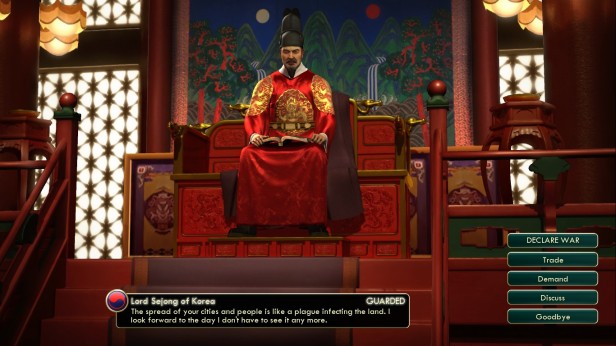
It was the summer of 2014, or maybe the spring of 2013… Ummm… Ok I can’t remember when it happened but I was definitely playing as the English Empire, because, you know, colonialism. Anyway, everything was going great. I had my coastal empire. I had all the dye and ivory I could ever need. And most importantly I had stable allies. Korea had long been a close friend: we traded, we shared technology and we even had a defensive pact. Life was good. Then the modern era arrived, and with it came the the ideologies of Freedom, Order and Autocracy. For those of you who don’t know, when you reach a certain point in the game you pick an ideology which gives you extra policies that are essentially Capitalism, Communism and Fascism. Being the lover of democracy, suffrage and liberty that I am I quickly plumped for Freedom. *Insert video of a british bulldog waving the Union flag whilst barking along to rule Britannia”. Sadly it turned out that my Korean friends were a bunch of fascist dickheads. Relations quickly deteriorated. My once steadfast allies reneged on all of our treaties and stabbed me in the back by declaring all out war. I obviously had no choice but to crush them under foot which I did, and I enjoyed every moment of it. But after their empire had gone up in smoke I couldn’t help but feel annoyed, A perfectly good alliance had been completely destroyed simply because the negative weighting of having a different ideology overruled what had been centuries of in game co-operation and friendship. There was no option to work through any differences or take things a different way; no it had to be war, and a war I was subject to, not a war in which is was a willing participant.

This system has it’s faults. But is it possible to design a system that’s more intelligent and feels far less forced? Well probably not. It may not seem like a crazy goal but I think there are two key obstacles that will prevent 4x and grand strategy games from ever getting diplomacy right.
Politicians diplomats and negotiators are people, not machines. (Ok well maybe not politicians, they jury is still out on that one) The only way a diplomacy system will be realistic dynamic and interesting to players is if your computer opponent has a similar approach, not in goals but in method. It’s part of the fun of it, you want something and you have to figure out how to manoeuvre and charm your way to the prize. Now I’m not a computer programmer but I’m pretty sure that we are quite far off of artificial intelligence that is capable of imitating human thought processes. Each party must be able to assess a situation and decide itself if it’s suit their goals. Only an intelligent AI can come close to being a players equal in this respect. Sadly it’s just not feasible, at least not right now. Technology moves fast and maybe one day an AI opponent will have the wiles to pose an interesting challenge or the wit and charm to be a reliable ally, but I don’t see it happening anytime soon.
The second constraint is fundamental, games are about winning. We play games to get those sweet sweet feelings that accompany victory. There is no room for compromise, we want to win. In contrast diplomacy is about working together to solve issues and keep the peace. Now of course in reality it doesn’t always work out to be a beautifully utopian process where diplomats sit around making daisy chains, sing along to folk songs and solve the world’s problems but at least they try. The aims of gaming are just incompatible with those of diplomacy, so how can you build a system that emulates teamwork and collaboration when you are constantly trying to gain the upper hand and screw your rivals over? You can’t. Can you imagine how boring it would be to end a game with a screen flashing “Congrats, nobody won! Have a pixel friendship bracelet!” It would be terrible, no one would play it.
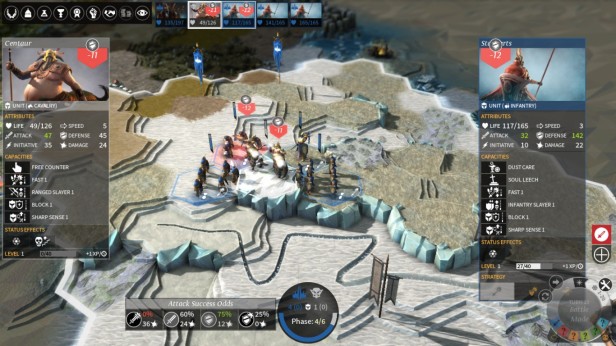
It’s clear that the dynamic, party driven diplomacy system I dream of is never going to come to fruition. The limits of the format and the technological advances required are too much to overcome. So it looks like we are stuck with points And I think that’s just fine. It’s not perfect but it fits it’s purpose and with each iteration it gets that little bit better. So here’s to our flawed points system, long may you annoy and frustrate future wannabe despots.

Note: All pictures used in this article are screenshots taken of gameplay or in-game animations of Rome: Total War 2, Sid Meier’s Civilisation V or Endless Legend.

